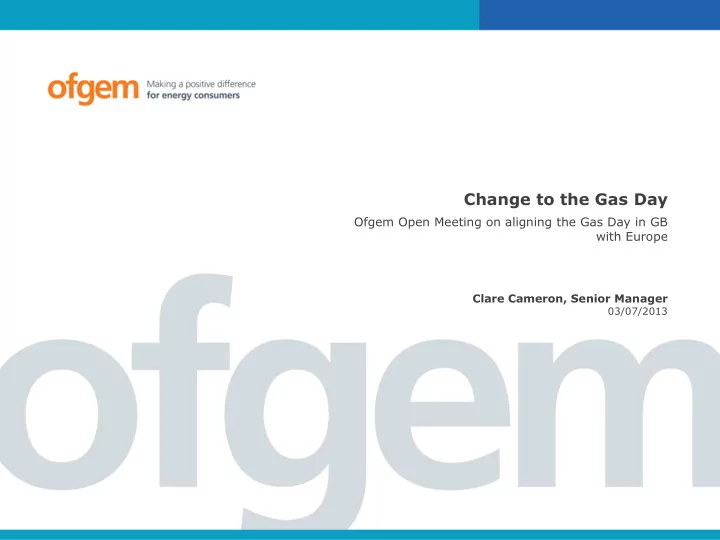

Change to the Gas Day Ofgem Open Meeting on aligning the Gas Day in GB with Europe Clare Cameron, Senior Manager 03/07/2013
Welcome and INTRODUCTION 2
Welcome and Housekeeping • Thank you for attending today – your views are important to us. • General notices. 3
Introduction • Why, what and when change? • What high-level work streams are there? – GB Legislation and licenses – Industry codes – Wider industry impacts 4
Why Change? • Driven by European legislation; namely, the Capacity Allocation Mechanism (CAM) network code, which will be directly binding on GB. • Article 3(7) of CAM sets out a new definition of ‘gas day’ for European member states that is different from our current ‘gas day’. • Gas Balancing network code will require a harmonised European ‘gas day’. This applies to the whole network. • Therefore, GB must change its ‘gas day’ for the whole network to align with new European legal requirements. 6
What is the Change? GB currently: CAM: • • CAM says: “‘gas day’ means The Gas (Calculation of Thermal Energy) Regulations the period from 5:00 to 1996 (as amended) say: ““gas 5:00 UTC the following day day” means a period for winter time and from beginning at 6am on one day 4:00 to 4:00 UTC the and ending immediately following day when daylight before 6am on the following saving is applied” day” 7
When Change? • CAM to be implemented by 1 November 2015 • We encourage aligning the ‘gas day’ as soon as practicable • NGG has suggested the change come into effect on 1 October 2015 to align with the new gas year • Reactions to this and the possibility of earlier implementation? 8
High-level WORK STREAMS 9
Work streams We consider there to be three concurrent high-level work streams: GB legislation and licenses Industry Codes Wider industry impacts 10
GB Legislation and Licenses • Current intention: Ofgem led. Potentially Ofgem and DECC led. • One legislative change: The Gas (Calculation of Thermal Energy) Regulations 1996. Current intention: Ofgem to change definition of ‘gas day’ with consent from Secretary of State. • Licenses: – Current intention: Ofgem to review and make any necessary updates licenses to reflect new gas day – will follow usual licence modification process. – Current intention: Ofgem to consider including licence condition for transporters (including distribution), interconnectors and shippers to ensure their arrangements and processes align with the new definition of the ‘gas day’. 11
Quick Overview of Licence Modification Process • Informal consultation: sets out what we propose to change and why. Likely to give a period of 4 to 8 weeks to respond. • Statutory (or formal consultation). Consultation period to be not less than 28 calendar days from the publication of the consultation document. • Once the modification direction has been made there will be a 56 day window during which appeals can be made to the Competition Commission. Providing no appeals are received the licence modification will take effect. 12
Industry Codes • Current intention: Largely industry led process. May change depending upon progress. • Uniform Network Code (UNC): National Grid (NG) led process. • Independent Gas Transporters (iGT) UNC: Process to be led by iGTs 13
UNC • NG has raised modification ‘0461: Changing the UNC Gas Day to Align with the Gas Day in EU Network Codes’ • This has been sent to a workgroup to discuss and work up a proposed solution (e.g. Which parts of the UNC should be changed and how ...) • Workgroup to report to the UNC modification panel in December 2013 with proposed modification solution • Break for NG presentation. 14
iGT UNC • We currently consider a similar process should be followed for aligning the iGT UNC with the CAM definition of ‘gas day’. • Which iGT(s) would raise the modification? Which panel will the modification be raised at? 15
Wider industry impacts • Current intention: Largely industry led. May change depending on progress. • Here are some examples of the sorts of documents that may require amending to align with the revised ‘gas day’: – Industry contract terms (on and offshore) – Meter validation/telemetry equipment/metering equipment – Demand forecasting/estimation – Data flows and data exchange – Timings of business transactions – Claims validation agreements – Employment contracts – Capacity nominations/outage/OCM deadlines – IT systems • Are there any more? • DECC – interest in overall compliance • DECC – lead for offshore production regime 16
Process • Would you find it helpful to have regular meetings to share progress updates? • If so, would it be helpful to have both Ofgem and DECC attending? • Is there a need for wider publicity? If so, any views on how to reach people and timings? • Any other views on process? 17
Open Floor • Any other points you wish to raise? 18
Meeting Close • Thank you for your time and participation. 19
Recommend
More recommend